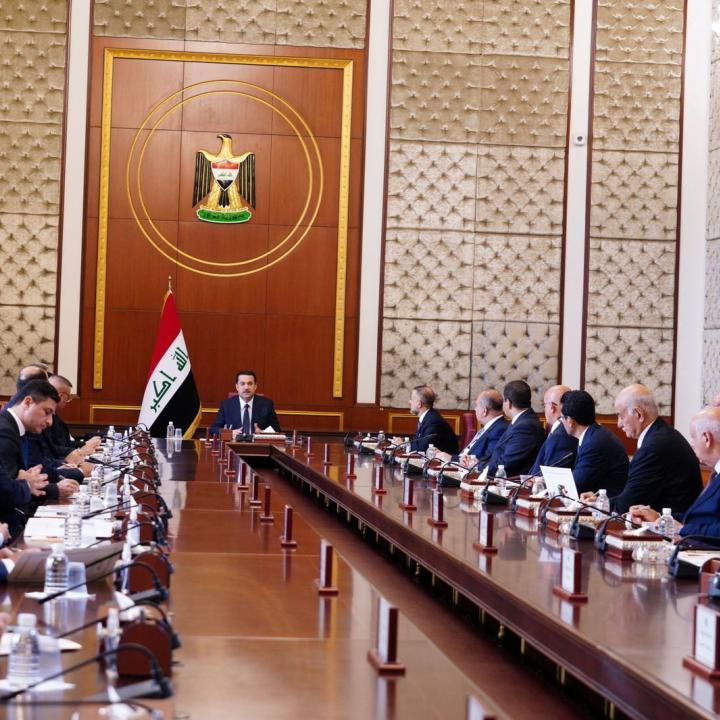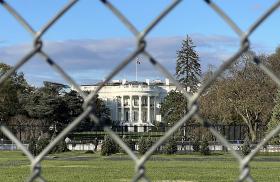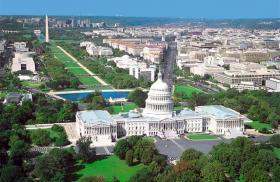
- Policy Analysis
- Fikra Forum
The Roadmap to a Second Term for Sudani: Between Hope and Hardship

While Sudani leverages his position as prime minister to pursue another term, Iran and its militia proxies increasingly favor a weaker leader who won’t challenge their influence.
Iraq’s November 11 parliamentary election will be taking place amid deep divisions in the Shia political factions comprising the Coordination Framework (CF). The power struggle between the two prime ministerial candidates, Mohammed Shia al-Sudani and Nouri al-Maliki, has intensified. It should be noted, however, that the head of the bloc that wins the largest number of seats in parliament will not necessarily become prime minister, since numerous factors will shape the next government’s formation.
Building a New Alliance
Sudani has been participating in Iraq’s political process since 2003. He was a close ally of Maliki, particularly as a member of the Islamic Dawa Party and the State of Law Alliance, both of which Maliki led. Following the Tishreen movement popular protests in 2019, Sudani left both the party and the alliance primarily in an attempt to become consensus prime minister after Adil Abdulmahdi’s resignation in 2019. However, the demonstrators strongly rejected Sudani’s proposed candidate, insisting that the new prime minister should be truly independent and unaffiliated with any existing political parties. Hence, Sudani’s dream was crushed when Mustafa al-Kadhimi became prime minister in May 2020. In January 2021 Sudani founded Tayyar al-Furatain and participated in the 2021 October election in which his party won only one parliamentary seat. However, his party’s seats increased to a total of three following the withdrawal of the Sadrist Movement. The 2021 parliamentary election and its consequences deepened Iraq’s political crisis. In particular, Muqtada al-Sadr’s bloc, which won a plurality of seats (73), insisted on forming a majoritarian national government—that is, one based on a narrow majority excluding his main Shia rivals in the CF aligned with Iran. For this purpose, Sadr formed a tripartite alliance formally called “Save the Homeland,” alongside the Kurdistan Democratic Party (KDP) led by Masoud Barzani and the Sunni Sovereignty coalition led by Mohammed al-Halbousi. However, the CF, supported by a ruling from the Iraqi Federal Supreme Court, blocked the tripartite alliance from forming a majoritarian government. This pushed the Sadrist Movement to withdraw from the political process in 2022. This shifted the political winds in Sudani’s favor, paving the way for him to become prime minister in October 2022 with the direct support of Maliki and the CF.
Sudani intended to run in provincial elections in December 2023 with his own separate list, but under pressure from Shia parties and in an attempt to protect his government, he chose not to participate. For the upcoming November election, however, Sudani has changed course and is forming his own list to challenge the CF directly. In May 2025, Sudani founded the Alliance for Reconstruction and Development, which has seven main blocs and includes military, tribal, and political leaders. The move caused significant divisions within Shia parties, which decided to field more than ten different lists in the election.
From Sudani’s first day as prime minister he has worked hard to consolidate his position and secure a second term. His political base was initially fragile, as he lacked a strong parliamentary bloc of his own. Shia militia groups even publicly called him a “general manager” rather than prime minister. Over time, however, he has improved his position, changing the balance of power in his favor within the CF. He was able to form a strong new coalition for the November election, and he also formed a new bloc in parliament with more than fifty MPs to strengthen his position.
Sudani’s coalition is mainly focusing on economic and development issues, such as fighting corruption, increasing pensions and public sector salaries, reducing unemployment, building roads and infrastructure, and implementing major development projects in Baghdad and other provinces. Accomplishments in these areas have enhanced Sudani’s standing, and a 2023 survey showed a 69 percent approval rating. However, this approval rating slightly decreased to 64 percent in September 2025.
Moreover, Sudani’s position as prime minister will itself help attract voters to his list and strengthen him politically. Prime ministers have always used the state’s resources, including revenues, to improve their political position, and Sudani is surely no exception.
Further, although the Sadrist movement has withdrawn from the election, given the unpredictability of its leader, Muqtada al-Sadr, it is not clear if he will remain neutral or openly support a specific party. The CF parties worry that Sadr could throw his support behind Sudani’s list, decisively changing the political landscape and electoral balance. Sadr may support Sudani’s list either directly or indirectly; notably, Sadr recently conditioned his support for any coalition on its commitment to dismantle armed groups, strengthen Iraq, and prevent external actors from intervening in Iraqi affairs. Finally, to some extent, Sudani enjoys the approval of the international community and has shown the ability to maintain regional balance, particularly with Iran, Arab states, and the United States. During the fall of the Bashar al-Assad regime and the Israel-Iran war, despite pressures from Iran and its Iraqi proxies, Sudani prevented Iraq from becoming involved. He is already leveraging this in his election campaign.
Maliki vs. Sudani: Electoral Rivalry and Power Struggles
Sudani’s main rival is Maliki and his State of Law Alliance. Maliki, the leader of the Islamic Dawa Party and a pro-Iranian figure with close ties with Shia armed groups, served two consecutive terms as prime minister, from 2006 to 2014. Sudani’s decision to run with his own list and his bid to serve a second term were crucial factors in intensifying his conflict with Maliki, who is concerned that Sudani could emerge as a leading figure in Shia electoral politics. The public and the electoral base of the two leaders overlap significantly, meaning that a victory for one would come at the expense of the other. Maliki therefore believes that Sudani’s rise would not only crush his ambitions to regain the premiership but would also obstruct his ability to install a close ally in the position.
Initially, Maliki pushed for early elections in an effort to prevent Sudani from strengthening his position, calling in a June 2024 interview with Alsharqiya for voting to be held by the end of 2024. He also called on the relevant authorities to prevent the use of state resources to secure votes. In the same interview, Maliki also advocated changing Iraqi law to return to the electoral system that was in place in 2021, in which each province is divided into multiple constituencies rather than being a single constituency as is the case now. However, most political parties, including the CF, the Sunnis, and Kurds, rejected his demands.
In August 2025, Iraqi President Abdul Latif Rashid, pressured by Maliki and his allies, issued several instructions on electoral transparency, which have been widely viewed as an effort to weaken Sudani’s position. Rashid’s instructions, the first of their kind since 2003, included preventing the distribution of land to government employees, halting all appointments in government institutions, and blocking the transfer or promotion of military officers. They emphasized that government financial and human resources must not be used to influence the outcome of the election. Moreover, Maliki, as part of his competition with Sudani, also put himself forward as the top candidate for his coalition in Baghdad. In effect, the battle for the premiership is not solely a competition between Maliki and Sudani; multiple internal and external factors will play a key role in shaping the formation of the next government and the selection of the new prime minister.
Backing or Battling? Sudani and the PMF
Since Sudani formed his government, he has attempted to strengthen his position with the Popular Mobilization Forces through policies favorable to them. Under his government, the number of members in the PMF increased from 122,000 to 238,000, while its budget rose to $3.6 billion. Moreover, Sudani approved the establishment of the Muhandis General Company, a PMF-affiliated economic conglomerate. Likewise, he endorsed the PMF’s support for a U.S. withdrawal from Iraq and backed legislation pushed by Iran and its allies within the CF in parliament, which aimed at further enhancing and institutionalizing the military and political position of the PMF. As a result of U.S. pressure, the CF has not yet pressed parliament to pass the bill. In addition, Sudani has brought PMF head Faleh al-Fayyad and Ahmed al-Asadi, leader of the PMF militia Kataib Jund al-Imam, into his coalition.
However, recently Kataib Hezbollah, the most powerful Iranian proxy in Iraq, has escalated its actions against Sudani in an attempt to weaken his position in the election. On July 27, its fighters stormed a government building in Baghdad, leading to a clash with security forces that left several dead or injured. This was the first time that Sudani’s government had fought back against Iranian proxies, leading Kataib Hezbollah to call on the CF to remove Sudani from power and to describe his desire for a second term as a dream that cannot be achieved. In fact, these messages, coming from Iran’s most reliable and powerful proxy, may signal that Tehran is not satisfied with Sudani’s policies and will not support him for a second term. Iran and its proxies oppose the establishment of a strong and independent Iraqi government that can maintain the country’s sovereignty, because a weak and fragile government will allow Iran and its proxies to operate more independently and increase their influence. Hence, Iran’s strategy in the upcoming election and the selection of the next prime minister has concentrated on maintaining unity among the parties within the CF, including selecting the proposed candidate for prime minister through an agreement within the CF rather than choosing the candidate who won the most seats. By using this procedure, Iran seeks to install a prime minister that is loyal to it and to its allies and ensure the implementation of its policies in Iraq and the wider region.
Besides this power struggle among Shia leaders, there are many Shia groups and parties like the Asaib Ahl al-Haq militia, led by Qais al-Khazali; Hadi al-Ameri’s Fatah Alliance; and the National State Forces Alliance, led by Ammar al-Hakim, that have decided to run in the election on separate lists. They have not clearly aligned themselves with any coalition and are likely awaiting the outcome of the election. However, because of their strong ties with Iran, they will defiantly support the candidate who enjoys Tehran’s approval.
Historically, Iraqi prime ministers other than Maliki have lacked a strong political base, mainly due to Iran’s consistent maneuvers to prevent the rise of a powerful Shia leader in Baghdad. The path to the premiership in Iraq is constrained by various political challenges and constitutional hardships. Therefore, there is no guarantee that the coalition winning the largest number of parliamentary seats will lead the next government.


